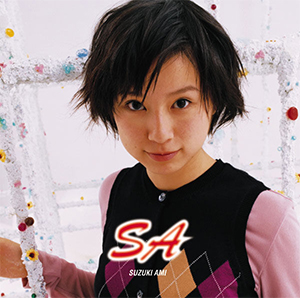
Tetsuya Komuro is a Japanese musician, songwriter and record producer. He is recognized as the most successful producer in Japanese music history and has introduced contemporary electronic dance music to the Japanese mainstream. He was also a former owner of the disco Velfarre located in Roppongi, Tokyo.
Globe was a dance-oriented Japanese pop band, formed in 1995 by the producer and songwriter Tetsuya Komuro. Originally consisting of Komuro, Keiko Yamada and Marc Panther, the group's singles consistently entered the charts. In late 2002, Yoshiki, the drummer and pianist оf X Japan, joined the group, but he left the band about a year later.

Ami Suzuki is a Japanese recording artist, DJ, and actress from Zama, Kanagawa, Japan. Having been discovered at the talent TV show Asayan, she was one of the most popular female teen idols in the late 1990s. However, in 2000, Suzuki faced legal problems with her management company resulting in a controversial blacklisting from the entertainment industry. Suzuki attempted to resurrect her career under her own steam with two indie singles before signing to Avex Trax in 2005. She released "Delightful", a dance song that reached No. 3 on the Japanese Oricon charts with a style similar to electronic club music, significantly different from her pop idol days. Since her appearance in the 2006 film Rainbow Song, Suzuki has gradually made a name for herself in the acting field, starring in various movies, television series, and musicals.

Around the World is the fourth studio album by Japanese singer Ami Suzuki. It marked her first release under the Avex Trax label. Ami released a single by the same name on the same day.

Love Enhanced Single Collection is the second greatest hits album by Japanese singer Namie Amuro under the Avex Trax label. The album covers 11 of the 12 singles she released after returning from a one-year maternity leave in 1998. The album excludes the single "Toi et Moi" which can only be found on its retailed single. The single was also excluded from her Genius 2000 album.

Genius 2000 is the fourth studio album by Japanese recording artist Namie Amuro, released on January 26, 2000, through Avex Trax. The album was released three years after her last album, Concentration 20 (1997), and was produced by Tetsuya Komuro and Dallas Austin, marking her first collaboration with an American producer, the album spawned four singles: "I Have Never Seen", "Respect the Power of Love", "Something 'bout the Kiss" and "Love 2000".

Fun for Fan is the first best of album released by the Sony Music label for Japanese singer Ami Suzuki on May 30, 2001.
Tomomi Kahara born Tomomi Shimogawara on August 17, 1974 in Tokyo), is a Japanese pop singer. She is famous for working with Tetsuya Komuro who gave her much success in the 1990s, which led to her deep dip in popularity after 1999, the year in which she released her first non-TK produced album, One Fine Day. Tomomi Kahara and Tetsuya Komuro dated for a few years, but they suffered from personal problems which led to their breakup. After a period of sickness, Kahara's talent agency terminated her contract on June 29, 2007.

SA is Ami Suzuki's debut album released under label Sony Music Japan on 25 March 1999.

"Can You Celebrate?" is the ninth single by Japanese recording artist Namie Amuro. Serving as the lead single for her third studio album Concentration 20, it was released on February 19, 1997. Its lyrics and composition was handled solely by Tetsuya Komuro. Musically, "Can You Celebrate?" is a power ballad with influences of gospel and classical music. "Can You Celebrate" is history's best-selling single by a female Japanese soloist, with sales of 2,296,200 copies. Additionally, it is ranked as the 14th best selling single of all time in the history of the Oricon Singles Chart.

"Body Feels Exit" is Namie Amuro's debut solo single on the Avex Trax label. Released nine days after her only album with former label, Toshiba-EMI, "Body Feels Exit" debuted in the top three on the Oricon chart and would be her first of 24 consecutive top ten solo singles.

I Have Never Seen is Namie Amuro's 11th single on the Avex Trax label. Released after a year hiatus, it serves their lead single for her fourth studio album Genius 2000, it debuted at #1 on January 11, 1999. It is her ninth number one single, and was her last until 2008's 60s 70s 80s. The single was certified double platinum by the RIAJ for 800,000 copies shipped to stores.

"Love 2000" is Namie Amuro's 15th single on the Avex Trax label. First pressing privileges came with a bonus remix of the title track. The same remix was later included on a vinyl single released two months after the CD version, as their fourth and final single Genius 2000, Released in Japan on New Year's Day, the single debuted at #4 becoming her 15th consecutive top 10 solo single. The single was certified platinum for 400,000 copies shipped.
"Love the Island" is the debut single of Japanese singer Ami Suzuki released on July 1, 1998 through True Kiss Disc, sub-label of Sony Music Entertainment Japan owned by Tetsuya Komuro.

"All Night Long" is a song recorded by Japanese singer Ami Suzuki for her debut studio album, SA (1999). It was written and produced by Japanese producer and songwriter Tetsuya Komuro. The track was released following Suzuki's two collaborative efforts with Komuro. "All Night Long" premiered on November 5, 1998, as the third single from the album.
"Be Together" is a song from Japanese band TM Network released in 11 November 1987. It was written by Mitsuko Komuro and composed by Tetsuya Komuro, it was included in their fifth album Humansystem. Despite the fact that it wasn't released as a single and was not popular at its initial release, the 1999 cover made by Ami Suzuki the song became very popular in Japan, and it has since been covered by several artists.

"Thank You 4 Every Day Every Body" is a song by Ami Suzuki, released as her eleventh single under Sony Music Japan.
Infamous Syndicate was an American hip hop duo from Chicago, comprising the female rappers Rashawnna "Shawnna" Guy and Lateefa "Teefa" Harland.

Supreme Show is the seventh studio album by Japanese recording artist Ami Suzuki. It was released on November 12, 2008 by Avex Trax as her 10th Anniversary album. It was also released ten months after her joint project album, Dolce. Supreme Show is Suzuki's first album to be fully produced, composed, and arranged by Japanese musician and Capsule member Yasutaka Nakata. Suzuki contributed to the album as the lead vocalist, background vocalist, and co-songwriter for the track "Love Mail". With tracks recorded in both English and Japanese language, Supreme Show is an electronic dance music album.
Tetsuya Komuro Archives refers to two separate box set releases featuring songs from various artists that were produced by the retired Japanese musician Komuro Tetsuya. They were released on June 27, 2018, by the Japanese record label Avex Trax. The box sets were released as Tetsuya Komuro Archives "T" and Tetsuya Komuro Archives "K", with each box set containing fifty songs divided into four separate discs.














